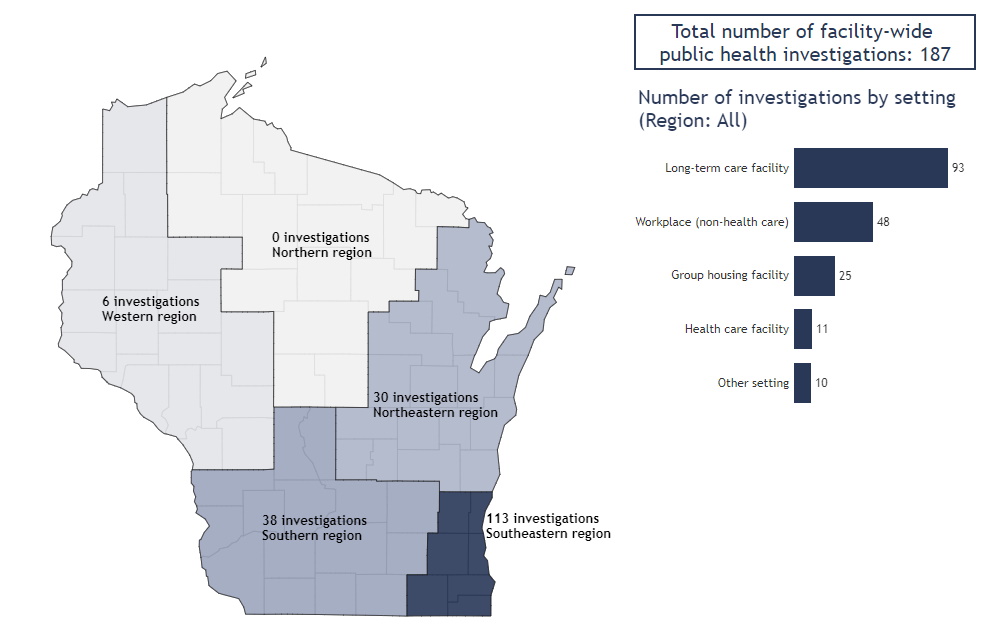Over 38% of Those That Died From COVID-19 Lived in Long-Term Care Facilities
Newly-public data highlights danger to those in nursing homes and assisted living facilities.

Investigations into facilities with COVID-19 outbreaks. Image from the Department of Health Services.
Data from the Wisconsin Department of Health Services shows that across the state more than 38 percent of those that have perished as a result of COVID-19 have resided in a long-term care facility, including nursing homes and assisted living facilities.
The information is part of a new section of the state’s COVID-19 outbreak website that shows high-level data on the number of investigations at long-term care facilities, group housing facilities, healthcare facilities, workplaces and other locations. An investigation is triggered by a single case at a long-term care facility and two cases in any of the other settings.
As of April 29th, there are 93 investigations underway at long-term care facilities, including 59 at facilities in the southeast region consisting of Milwaukee, Waukesha, Ozaukee, Washington, Racine, Kenosha and Walworth counties. The lowest level the state provides detail on is by region, similar to the Wisconsin Hospital Association dashboard.
Across the state there are 187 investigations underway, including 113 in the southeast region. The northern region, which stretches north from Stevens Point and Wisconsin Rapids to Lake Superior, has zero investigations.
Without identifying the facility, state data confirms that at least one long-term care facility has 54 confirmed cases of the disease.
The data on the age of those that have died from COVID-19 has long been published by the state. As of Saturday afternoon, 70.6 percent of the 334 people that have perished have been 70 years old or older. Over 31 percent of those aged 90 or older with a confirmed case of the disease have died. State data shows only seven people under the age of 40 have been confirmed to have died from the disease.
The confirmed cases of COVID-19 in Wisconsin do not have nearly the same age distribution as those who have died from the disease. Individuals aged 70 or older represent only 15 percent of cases. Individuals under 40 represent 36 percent of all cases.
The percentage of those that died in long-term care facilities understates the likely extent of the disparity. The state has no residency data in 35 percent of deaths. The DHS website notes that housing location has only been systematically collected since April 8th.
Dropping the cases where the residency of the deceased was unknown, the long-term care facility death total jumps to 59 percent of all deaths.
Beyond being concentrated in older individuals, the deaths have been disproportionally concentrated in African Americans. Individuals identifying as black made up 22 percent of cases and 31 percent of deaths while making up only 6.7 percent of the state’s population.
If you think stories like this are important, become a member of Urban Milwaukee and help support real, independent journalism. Plus you get some cool added benefits.
More about the Coronavirus Pandemic
- Governors Tony Evers, JB Pritzker, Tim Walz, and Gretchen Whitmer Issue a Joint Statement Concerning Reports that Donald Trump Gave Russian Dictator Putin American COVID-19 Supplies - Gov. Tony Evers - Oct 11th, 2024
- MHD Release: Milwaukee Health Department Launches COVID-19 Wastewater Testing Dashboard - City of Milwaukee Health Department - Jan 23rd, 2024
- Milwaukee County Announces New Policies Related to COVID-19 Pandemic - David Crowley - May 9th, 2023
- DHS Details End of Emergency COVID-19 Response - Wisconsin Department of Health Services - Apr 26th, 2023
- Milwaukee Health Department Announces Upcoming Changes to COVID-19 Services - City of Milwaukee Health Department - Mar 17th, 2023
- Fitzgerald Applauds Passage of COVID-19 Origin Act - U.S. Rep. Scott Fitzgerald - Mar 10th, 2023
- DHS Expands Free COVID-19 Testing Program - Wisconsin Department of Health Services - Feb 10th, 2023
- MKE County: COVID-19 Hospitalizations Rising - Graham Kilmer - Jan 16th, 2023
- Not Enough Getting Bivalent Booster Shots, State Health Officials Warn - Gaby Vinick - Dec 26th, 2022
- Nearly All Wisconsinites Age 6 Months and Older Now Eligible for Updated COVID-19 Vaccine - Wisconsin Department of Health Services - Dec 15th, 2022
Read more about Coronavirus Pandemic here




















